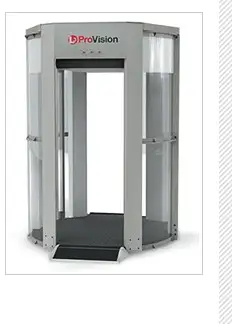
You have to draw the line somewhere.
This, it seems, is the fundamental quandary facing our government as it tries to keep pace with the evolving threat of terrorism. Where is the boundary between security and invasion of privacy, between vigorous screening and treating everyday passengers like potential terrorists? At what point do you move beyond simply monitoring a suspicious individual and place him or her on a no-fly list, or refuse a visa? How tight can security be before the cost outweighs the benefit?
These are the questions buzzing around as we wonder how to avoid a repeat of last week’s incident. Here are a few options, all of which are, at best, unpalatable.
Whole Body Imaging
Many have argued—correctly, it seems—that millimeter wave technology would have detected the explosives concealed on Umar Farouk Abdulmutallab’s body. These scanners, which create grayscale images of passengers’ naked bodies, are highly controversial. They have drawn the ire of privacy rights advocates as well as SmarterTravel readers, a majority of which disapproved of them back in March. But that was then—now, with an attack splashed across the front pages, readers seem more accepting of millimeter wave scanners.
The flip side, however, is that the machines are pretty good at detecting concealed objects, and do so relatively quickly. This makes them an effective, efficient tool for detecting hidden bombs or bomb-making materials, and they do avoid the discomfort of a physical pat-down. But is it worth sacrificing our right to privacy?
Profiling
There are two basic types of profiling, separated by a wide gray area: Ethnic profiling and behavioral profiling. Many are now arguing for ethnic profiling, noting that the decade’s numerous terrorist attacks have, by and large, been carried out by Muslim extremists, most of them young and male. Profiling, though, opens a veritable Pandora’s box of issues, not the least of which is a perception, in the Arab world, of anti-Muslim sentiment here in America. No doubt extremist groups would use this to ratchet up enthusiasm for their cause. And for those extremists, the workaround for ethnic profiling is simple: Recruit a white, even non-Muslim person who is unhappy with the U.S.’s behavior over the past few years. Problem solved.
Behavioral profiling is another story. Israeli airport security utilizes this tactic, which has screeners look for certain behaviors, such as nervousness or anxiousness, along with other factors, and select those passengers for additional scrutiny. The approach can easily backslide into racial profiling in the wrong hands, especially in an environment so charged with suspicion and presumption. But in theory, it provides an opportunity to identify potentially risky individuals in a large group of people.
Our Mindset
Here’s the thing: There is no 100% foolproof approach to preventing terrorist attacks. This is a tough reality to swallow—we give up our sense of strength by admitting it. But it’s true because no matter where you draw the line, you are simply challenging someone to find a way across it.
As Patrick Smith wrote this past September, “We’ll never be completely safe, and we should stop pretending otherwise. Civil aviation will continue to be a target, and air crimes will never disappear. [But] acknowledging a certain level of risk is not the same as rolling over. We can and should improve our odds. Doing so, however, will require us to be the one thing we thus far haven’t been: reasonable. If anything, security overall ought to be scaled back, into a leaner but more focused operation.”
I won’t pretend to be a security expert, but I would suggest that the TSA has ignored a vital lesson over the past few years: Terrorists adapt. They move on to other tactics. TSA, at least in their screening procedures, is prepared for yesterday, not tomorrow. Perhaps a leaner, more focused approach, as Smith advocates, that looks at people rather than precedent, would be more effective. But in our attempt to be perfect, the tendency is to focus on the devil we know, not the one we haven’t yet met.
What Do You Think?
Caught in the middle of all this, of course, is us. We’re the ones taking our shoes off in security, separating our liquids, subjecting ourselves to scans and searches and inane in-flight restrictions. At what point do we say “enough is enough?” Where do we draw the line between what we’ll tolerate and what we won’t? What cost will we pay for security, or at least the sense of it? Please leave a comment below with your thoughts.
We hand-pick everything we recommend and select items through testing and reviews. Some products are sent to us free of charge with no incentive to offer a favorable review. We offer our unbiased opinions and do not accept compensation to review products. All items are in stock and prices are accurate at the time of publication. If you buy something through our links, we may earn a commission.
Related
Top Fares From
Today's Top Travel Deals
Brought to you by ShermansTravel
Ireland: 9-Night Dublin, Kilkenny, Killarney, Galway...
Brendan Vacations
 vacation
$3875+
vacation
$3875+
Amsterdam to Copenhagen: Luxe, 18-Night Northern...
Regent Seven Seas Cruises



Ohio: Daily Car Rentals from Cincinnati
85OFF.com





